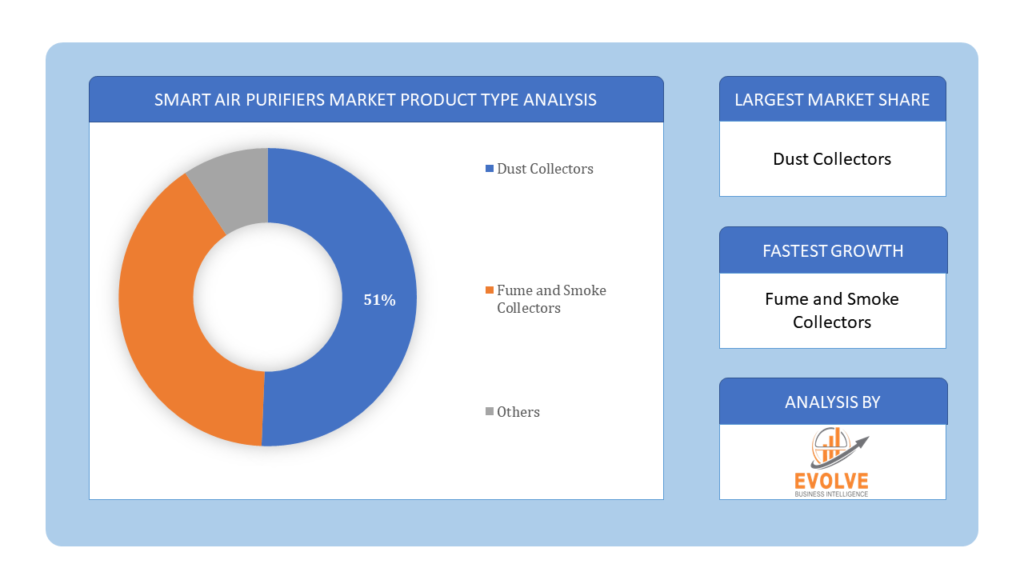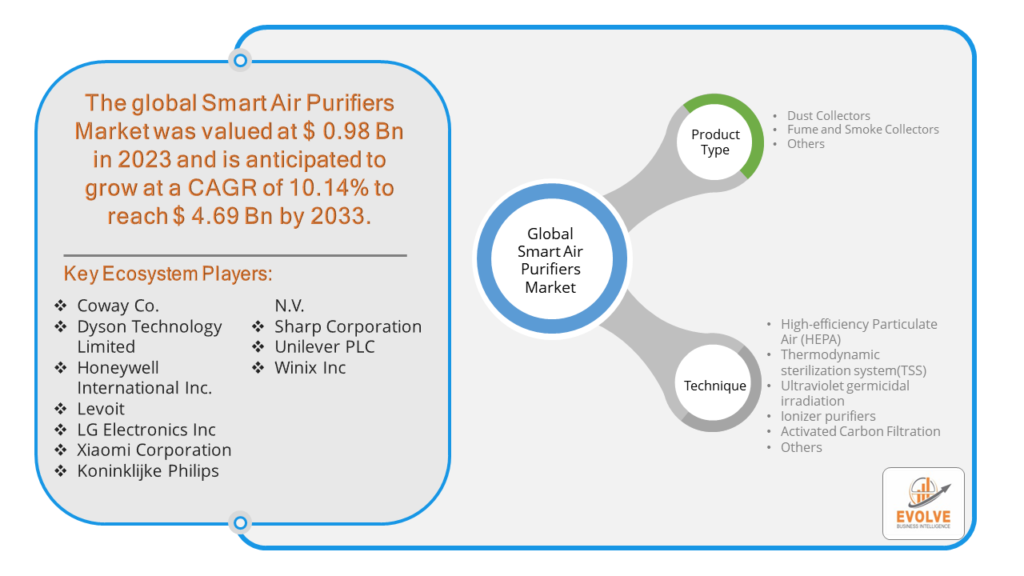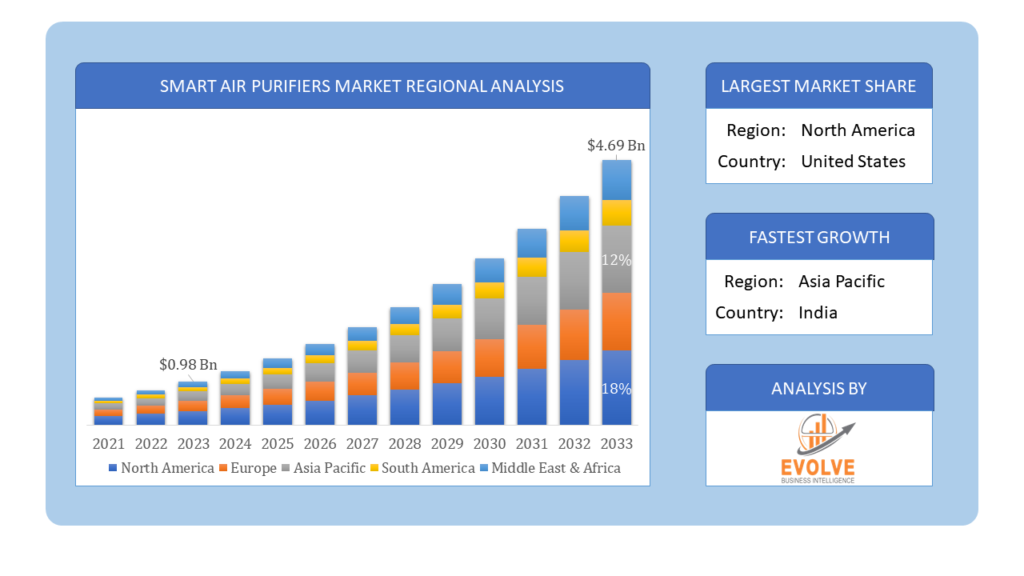Smart Air Purifiers Market Analysis and Global Forecast 2023-2033
$ 1,390.00 – $ 5,520.00Price range: $ 1,390.00 through $ 5,520.00
Smart Air Purifiers Market Research Report: Information By Product Type (Dust Collectors, Fume, and Smoke Collectors, Others), By Technique (High-efficiency Particulate Air (HEPA), Thermodynamic sterilization system(TSS), Ultraviolet germicidal irradiation, Ionizer purifiers, Activated Carbon Filtration, Others), and by Region — Forecast till 2033
Page: 114
Smart Air Purifiers Market Overview
The Smart Air Purifiers Market Size is expected to reach USD 4.69 Billion by 2033. The Smart Air Purifiers Market industry size accounted for USD 0.98 Billion in 2023 and is expected to expand at a compound annual growth rate (CAGR) of 10.14% from 2023 to 2033. The Smart Air Purifiers Market encompasses the global industry involved in the design, manufacturing, distribution, and sales of air purifiers equipped with smart technology. These devices use advanced sensors, IoT connectivity, and artificial intelligence to monitor and improve indoor air quality.
The Smart Air Purifiers Market is expected to grow significantly in the coming years due to the increasing demand for advanced air quality solutions and the integration of smart technologies into everyday appliances.
Global Smart Air Purifiers Market Synopsis
The COVID-19 pandemic had a significant impact on the Smart Air Purifiers Market. The pandemic heightened awareness about the importance of indoor air quality, as people spent more time indoors due to lockdowns and remote work. Concerns about airborne transmission of the virus spurred interest in air purifiers. Demand for air purifiers, including smart variants, surged as consumers sought to improve indoor air quality to reduce the risk of COVID-19 transmission. This increased sales across residential and commercial segments. The pandemic caused significant disruptions in global supply chains, leading to delays in the production and distribution of smart air purifiers. Shortages of components and raw materials affected manufacturing timelines. The pandemic accelerated innovation in the smart air purifier market, leading to the development of more advanced products. Features such as AI-driven air quality analytics, improved filtration technologies, and seamless integration with smart home ecosystems are expected to become standard.
Smart Air Purifiers Market Dynamics
The major factors that have impacted the growth of Smart Air Purifiers Market are as follows:
Drivers:
Ø Technological Advancements
Innovations in smart technology, including IoT integration, artificial intelligence, and advanced sensors, have made air purifiers more efficient and user-friendly. Features like real-time air quality monitoring, remote control via smartphones, and automated adjustments appeal to tech-savvy consumers. The rising trend of smart homes, where various devices are interconnected and controlled via a central system, is driving the demand for smart air purifiers. Consumers prefer integrated solutions that can be managed through smart home systems Rapid urbanization, especially in emerging economies, leads to higher exposure to indoor and outdoor pollutants. The expanding middle class with increased disposable income is more likely to invest in health and wellness products, including smart air purifiers.
Restraint:
- Perception of High Initial Cost
Smart air purifiers are generally more expensive than traditional air purifiers due to their advanced features and technologies. This higher cost can be a barrier for price-sensitive consumers, limiting market growth. Regular maintenance, including filter replacements and cleaning, can add to the overall cost of ownership. Consumers may be deterred by the ongoing expenses associated with maintaining optimal performance. The advanced features and smart functionalities of these devices can be overwhelming for some users, particularly those who are not tech-savvy. This complexity can lead to underutilization of the features and reduced customer satisfaction.
Opportunity:
⮚ Increasing Disposable Income
The rise in disposable income, particularly in emerging economies, allows more consumers to afford premium products like smart air purifiers. This economic growth can drive market expansion. Developing air purifiers with sustainable materials and energy-efficient technologies can appeal to environmentally conscious consumers. Eco-friendly designs and recyclable filters can also enhance brand image and customer loyalty. There is significant untapped potential in emerging markets where air pollution is a growing concern. Targeting these regions with affordable and efficient smart air purifiers can lead to substantial market expansion.
Smart Air Purifiers Market Segment Overview
By Product Type
 Based on Product Type, the market is segmented based on Dust Collectors, Fume, and Smoke Collectors and Others. The Dust Collectors segment dominant the market. Dust is a ubiquitous indoor air pollutant found in homes, offices, industrial spaces, and commercial establishments. Moreover, dust collectors are versatile in their application. They can effectively remove various types of particles, not just dust but also airborne pollutants like mold spores and bacteria. This versatility makes them suitable for a wide range of indoor spaces, including homes, offices, and industrial settings.
Based on Product Type, the market is segmented based on Dust Collectors, Fume, and Smoke Collectors and Others. The Dust Collectors segment dominant the market. Dust is a ubiquitous indoor air pollutant found in homes, offices, industrial spaces, and commercial establishments. Moreover, dust collectors are versatile in their application. They can effectively remove various types of particles, not just dust but also airborne pollutants like mold spores and bacteria. This versatility makes them suitable for a wide range of indoor spaces, including homes, offices, and industrial settings.
By Technique
Based on Technique, the market segment has been divided into the High-efficiency Particulate Air (HEPA), Thermodynamic sterilization system(TSS), Ultraviolet germicidal irradiation, Ionizer purifiers, Activated Carbon Filtration and Others. The High-efficiency Particulate Air segment dominant the market. HEPA filters have a well-established reputation for their exceptional air filtration capabilities. This high level of filtration makes them highly effective at removing common airborne pollutants such as dust, pollen, pet dander, smoke, and even some bacteria and viruses. Consumers trust HEPA filters for their ability to deliver clean, purified air.
Global Smart Air Purifiers Market Regional Analysis
Based on region, the global Smart Air Purifiers Market has been divided into North America, Europe, Asia-Pacific, the Middle East & Africa, and Latin America. North America is projected to dominate the use of the Smart Air Purifiers Market followed by the Asia-Pacific and Europe regions.
 Smart Air Purifiers North America Market
Smart Air Purifiers North America Market
North America holds a dominant position in the Smart Air Purifiers Market. High awareness of air quality issues, strong adoption of smart home technologies, and significant health and wellness trends. High awareness of air quality issues, strong adoption of smart home technologies, and significant health and wellness trends. Increasing integration with smart home ecosystems, higher adoption of energy-efficient and eco-friendly products.
Smart Air Purifiers Asia-Pacific Market
The Asia-Pacific region has indeed emerged as the fastest-growing market for the Smart Air Purifiers Market industry. Rapid industrialization and urbanization in countries like China and India have led to critical air pollution levels. This creates a strong need for effective air filtration solutions, driving demand for smart air purifiers. People in these regions are becoming increasingly aware of the health risks associated with air pollution. This awareness fuels the market for smart air purifiers seen as a way to improve indoor air quality and protect health
Competitive Landscape
The global Smart Air Purifiers Market is highly competitive, with numerous players offering a wide range of software solutions. The competitive landscape is characterized by the presence of established companies, as well as emerging startups and niche players. To increase their market position and attract a wide consumer base, the businesses are employing various strategies, such as product launches, and strategic alliances.
Prominent Players:
- Coway Co.
- Dyson Technology Limited
- Honeywell International Inc.
- Levoit
- LG Electronics Inc
- Xiaomi Corporation
- Koninklijke Philips N.V.
- Sharp Corporation
- Unilever PLC
- Winix Inc
Scope of the Report
Global Smart Air Purifiers Market, by Product Type
- Dust Collectors
- Fume and Smoke Collectors
- Others
Global Smart Air Purifiers Market, by Technique
- High-efficiency Particulate Air (HEPA)
- Thermodynamic sterilization system(TSS)
- Ultraviolet germicidal irradiation
- Ionizer purifiers
- Activated Carbon Filtration
- Others
Global Smart Air Purifiers Market, by Region
- North America
- US
- Canada
- Mexico
- Europe
- UK
- Germany
- France
- Italy
- Spain
- Benelux
- Nordic
- Rest of Europe
- Asia Pacific
- China
- Japan
- South Korea
- Indonesia
- Austalia
- Malaysia
- India
- Rest of Asia Pacific
- South America
- Brazil
- Argentina
- Rest of South America
- Middle East & Africa
- Saudi Arabia
- UAE
- Egypt
- South Africa
- Rest of Middle East & Africa
| Parameters | Indicators |
|---|---|
| Market Size | 2033: $4.69 Billion |
| CAGR | 10.14% CAGR (2023-2033) |
| Base year | 2022 |
| Forecast Period | 2023-2033 |
| Historical Data | 2021 |
| Report Coverage | Revenue Forecast, Competitive Landscape, Growth Factors, and Trends |
| Key Segmentations | Product Type, Technique |
| Geographies Covered | North America, Europe, Asia-Pacific, Latin America, Middle East, Africa |
| Key Vendors | Coway Co., Dyson Technology Limited, Honeywell International Inc., Levoit, LG Electronics Inc, Xiaomi Corporation, Koninklijke Philips N.V., Sharp Corporation, Unilever PLC and Winix Inc |
| Key Market Opportunities | • Increasing Disposable Income • Eco-friendly and Sustainable Products |
| Key Market Drivers | • Technological Advancements • Increasing Adoption of Smart Home Technologies |
REPORT CONTENT BRIEF:
- High-level analysis of the current and future Smart Air Purifiers Market trends and opportunities
- Detailed analysis of current market drivers, restraining factors, and opportunities in the future
- Smart Air Purifiers Market historical market size for the year 2021, and forecast from 2023 to 2033
- Smart Air Purifiers Market share analysis at each product level
- Competitor analysis with detailed insight into its product segment, Government & Defense strength, and strategies adopted.
- Identifies key strategies adopted including product launches and developments, mergers and acquisitions, joint ventures, collaborations, and partnerships as well as funding taken and investment done, among others.
- To identify and understand the various factors involved in the global Smart Air Purifiers Market affected by the pandemic
- To provide a detailed insight into the major companies operating in the market. The profiling will include the Government & Defense health of the company’s past 2-3 years with segmental and regional revenue breakup, product offering, recent developments, SWOT analysis, and key strategies.
Press Release

Global Pharmaceutical Manufacturing Market to Reach $1.38 Trillion by 2035 with 7.35% CAGR, New Research Shows

The Global Mammography Market Is Estimated To Record a CAGR of Around 10.29% During The Forecast Period

Glue Stick Market to Reach USD 2.35 Billion by 2034

Podiatry Service Market to Reach USD 11.88 Billion by 2034

Microfluidics Technology Market to Reach USD 32.58 Billion by 2034

Ferric Chloride Market to Reach USD 10.65 Billion by 2034

Family Practice EMR Software Market to Reach USD 21.52 Billion by 2034

Electric Hairbrush Market to Reach USD 15.95 Billion by 2034

Daily Bamboo Products Market to Reach USD 143.52 Billion by 2034

Cross-border E-commerce Logistics Market to Reach USD 112.65 Billion by 2034
Frequently Asked Questions (FAQ)
1.What is the study period of this market?
- The study period of the global Smart Air Purifiers Market is 2021- 2033
2.What is the growth rate of the global Smart Air Purifiers Market?
- The global Smart Air Purifiers Market is growing at a CAGR of 10.14% over the next 10 years
3.Which region has the highest growth rate in the market of Smart Air Purifiers Market?
- Asia Pacific is expected to register the highest CAGR during 2023-2033
4.Which region has the largest share of the global Smart Air Purifiers Market?
- North America holds the largest share in 2022
5.Who are the key players in the global Smart Air Purifiers Market?
Coway Co., Dyson Technology Limited, Honeywell International Inc., Levoit, LG Electronics Inc, Xiaomi Corporation, Koninklijke Philips N.V., Sharp Corporation, Unilever PLC and Winix Inc. are the major companies operating in the market
6.Do you offer Post Sale Support?
- Yes, we offer 16 hours of analyst support to solve the queries
7.Do you sell particular sections of a report?
Yes, we provide regional as well as country-level reports. Other than this we also provide a sectional report. Please get in contact with our sales representatives
Table of Content
Chapter 1. Executive Summary Chapter 2. Scope Of The Study 2.1. Market Definition 2.2. Scope Of The Study 2.2.1. Objectives of Report 2.2.2. Limitations 2.3. Market Structure Chapter 3. Evolve BI Methodology Chapter 4. Market Insights and Trends 4.1. Supply/ Value Chain Analysis 4.1.1. Raw End Users Providers 4.1.2. Manufacturing Process 4.1.3. Distributors/Retailers 4.1.4. End-Use Industry 4.2. Porter’s Five Forces Analysis 4.2.1. Threat Of New Entrants 4.2.2. Bargaining Power Of Buyers 4.2.3. Bargaining Power Of Suppliers 4.2.4. Threat Of Substitutes 4.2.5. Industry Rivalry 4.3. Impact Of COVID-19 on the Smart Air Purifiers Market 4.3.1. Impact on Market Size 4.3.2. End-Use Industry Trend, Preferences, and Budget Impact 4.3.3. Regulatory Framework/Government Policies 4.3.4. Key Players' Strategy to Tackle Negative Impact 4.3.5. Opportunity Window 4.4. Technology Overview 12.28. Macro factor 4.6. Micro Factor 4.7. Demand Supply Gap Analysis of the Smart Air Purifiers Market 4.8. Import Analysis of the Smart Air Purifiers Market 4.9. Export Analysis of the Smart Air Purifiers Market Chapter 5. Market Dynamics 5.1. Introduction 5.2. DROC Analysis 5.2.1. Drivers 5.2.2. Restraints 5.2.3. Opportunities 5.2.4. Challenges 5.3. Patent Analysis 5.4. Industry Roadmap 5.5. Parent/Peer Market Analysis Chapter 6. Global Smart Air Purifiers Market, By Product Type 6.1. Introduction 6.2. Dust Collectors 6.3. Fume and Smoke Collectors 6.4. Others Chapter 7. Global Smart Air Purifiers Market, By Technique 7.1. Introduction 7.2. High-efficiency Particulate Air (HEPA) 7.3. Thermodynamic sterilization system(TSS) 7.4. Ultraviolet germicidal irradiation 7.5. Ionizer purifiers 7.6. Activated Carbon Filtration 7.7. Others Chapter 8. Global Smart Air Purifiers Market, By Region 8.1. Introduction 8.2. North America 8.2.1. Introduction 8.2.2. Driving Factors, Opportunity Analyzed, and Key Trends 8.2.3. Market Size and Forecast, By Country, 2023-2033 8.2.4. Market Size and Forecast, By Product Type, 2023-2033 8.2.5. Market Size and Forecast, By End User, 2023-2033 8.2.6. US 8.2.6.1. Introduction 8.2.6.2. Driving Factors, Opportunity Analyzed, and Key Trends 8.2.6.3. Market Size and Forecast, By Product Type, 2023-2033 8.2.6.4. Market Size and Forecast, By End User, 2023-2033 8.2.7. Canada 8.2.7.1. Introduction 8.2.7.2. Driving Factors, Opportunity Analyzed, and Key Trends 8.2.7.4. Market Size and Forecast, By Product Type, 2023-2033 8.2.7.5. Market Size and Forecast, By End User, 2023-2033 8.3. Europe 8.3.1. Introduction 8.3.2. Driving Factors, Opportunity Analyzed, and Key Trends 8.3.3. Market Size and Forecast, By Country, 2023-2033 8.3.4. Market Size and Forecast, By Product Type, 2023-2033 8.3.5. Market Size and Forecast, By End User, 2023-2033 8.3.6. Germany 8.3.6.1. Introduction 8.3.6.2. Driving Factors, Opportunity Analyzed, and Key Trends 8.3.6.3. Market Size and Forecast, By Product Type, 2023-2033 8.3.6.4. Market Size and Forecast, By End User, 2023-2033 8.3.7. France 8.3.7.1. Introduction 8.3.7.2. Driving Factors, Opportunity Analyzed, and Key Trends 8.3.7.3. Market Size and Forecast, By Product Type, 2023-2033 8.3.7.4. Market Size and Forecast, By End User, 2023-2033 8.3.8. UK 8.3.8.1. Introduction 8.3.8.2. Driving Factors, Opportunity Analyzed, and Key Trends 8.3.8.3. Market Size and Forecast, By Product Type, 2023-2033 8.3.8.4. Market Size and Forecast, By End User, 2023-2033 8.3.9. Italy 8.3.9.1. Introduction 8.3.9.2. Driving Factors, Opportunity Analyzed, and Key Trends 8.3.9.3. Market Size and Forecast, By Product Type, 2023-2033 8.3.9.4. Market Size and Forecast, By End User, 2023-2033 8.3.11. Rest Of Europe 8.3.11.1. Introduction 8.3.11.2. Driving Factors, Opportunity Analyzed, and Key Trends 8.3.11.3. Market Size and Forecast, By Product Type, 2023-2033 8.3.11.4. Market Size and Forecast, By End User, 2023-2033 8.4. Asia-Pacific 8.4.1. Introduction 8.4.2. Driving Factors, Opportunity Analyzed, and Key Trends 8.4.3. Market Size and Forecast, By Country, 2023-2033 8.4.4. Market Size and Forecast, By Product Type, 2023-2033 8.12.28. Market Size and Forecast, By End User, 2023-2033 8.4.6. China 8.4.6.1. Introduction 8.4.6.2. Driving Factors, Opportunity Analyzed, and Key Trends 8.4.6.3. Market Size and Forecast, By Product Type, 2023-2033 8.4.6.4. Market Size and Forecast, By End User, 2023-2033 8.4.7. India 8.4.7.1. Introduction 8.4.7.2. Driving Factors, Opportunity Analyzed, and Key Trends 8.4.7.3. Market Size and Forecast, By Product Type, 2023-2033 8.4.7.4. Market Size and Forecast, By End User, 2023-2033 8.4.8. Japan 8.4.8.1. Introduction 8.4.8.2. Driving Factors, Opportunity Analyzed, and Key Trends 8.4.8.3. Market Size and Forecast, By Product Type, 2023-2033 8.4.8.4. Market Size and Forecast, By End User, 2023-2033 8.4.9. South Korea 8.4.9.1. Introduction 8.4.9.2. Driving Factors, Opportunity Analyzed, and Key Trends 8.4.9.3. Market Size and Forecast, By Product Type, 2023-2033 8.4.9.4. Market Size and Forecast, By End User, 2023-2033 8.4.10. Rest Of Asia-Pacific 8.4.10.1. Introduction 8.4.10.2. Driving Factors, Opportunity Analyzed, and Key Trends 8.4.10.3. Market Size and Forecast, By Product Type, 2023-2033 8.4.10.4. Market Size and Forecast, By End User, 2023-2033 8.5. Rest Of The World (RoW) 8.5.1. Introduction 8.5.2. Driving Factors, Opportunity Analyzed, and Key Trends 8.5.3. Market Size and Forecast, By Product Type, 2023-2033 8.5.4. Market Size and Forecast, By End User, 2023-2033 Chapter 9. Company Landscape 9.1. Introduction 9.2. Vendor Share Analysis 9.3. Key Development Analysis 9.4. Competitor Dashboard Chapter 10. Company Profiles 10.1. Coway Co. 10.1.1. Business Overview 10.1.2. Government & Defense Analysis 10.1.2.1. Government & Defense – Existing/Funding 10.1.3. Product Portfolio 10.1.4. Recent Development and Strategies Adopted 10.1.5. SWOT Analysis 10.2. Dyson Technology Limited 10.2.1. Business Overview 10.2.2. Government & Defense Analysis 10.2.2.1. Government & Defense – Existing/Funding 10.2.3. Product Portfolio 10.2.4. Recent Development and Strategies Adopted 10.2.5. SWOT Analysis 10.3. Honeywell International Inc. 10.3.1. Business Overview 10.3.2. Government & Defense Analysis 10.3.2.1. Government & Defense – Existing/Funding 10.3.3. Product Portfolio 10.3.4. Recent Development and Strategies Adopted 10.3.5. SWOT Analysis 10.4. Levoit 10.4.1. Business Overview 10.4.2. Government & Defense Analysis 10.4.2.1. Government & Defense – Existing/Funding 10.4.3. Product Portfolio 10.4.4. Recent Development and Strategies Adopted 10.12.28. SWOT Analysis 10.5. LG Electronics Inc 10.5.1. Business Overview 10.5.2. Government & Defense Analysis 10.5.2.1. Government & Defense – Existing/Funding 10.5.3. Product Portfolio 10.5.4. Recent Development and Strategies Adopted 10.5.5. SWOT Analysis 10.6. Xiaomi Corporation 10.6.1. Business Overview 10.6.2. Government & Defense Analysis 10.6.2.1. Government & Defense – Existing/Funding 10.6.3. Product Portfolio 10.6.4. Recent Development and Strategies Adopted 10.6.5. SWOT Analysis 10.7. Koninklijke Philips N.V. 10.7.1. Business Overview 10.7.2. Government & Defense Analysis 10.7.2.1. Government & Defense – Existing/Funding 10.7.3. Product Portfolio 10.7.4. Recent Development and Strategies Adopted 10.7.5. SWOT Analysis 10.8 Sharp Corporation 10.8.1. Business Overview 10.8.2. Government & Defense Analysis 10.8.2.1. Government & Defense – Existing/Funding 10.8.3. Product Portfolio 10.8.4. Recent Development and Strategies Adopted 10.8.5. SWOT Analysis 10.9 Unilever PLC 10.9.1. Business Overview 10.9.2. Government & Defense Analysis 10.9.2.1. Government & Defense – Existing/Funding 10.9.3. Product Portfolio 10.9.4. Recent Development and Strategies Adopted 10.9.5. SWOT Analysis 10.10. Winix Inc 10.10.1. Business Overview 10.10.2. Government & Defense Analysis 10.10.2.1. Government & Defense – Existing/Funding 10.10.3. Product Portfolio 10.10.4. Recent Development and Strategies Adopted 10.10.5. SWOT Analysis
Connect to Analyst
Research Methodology








